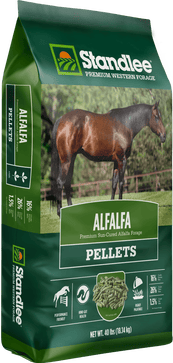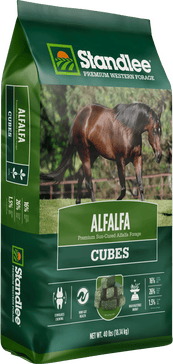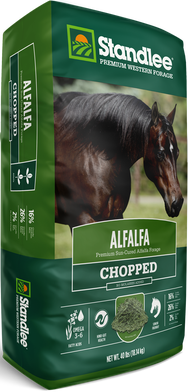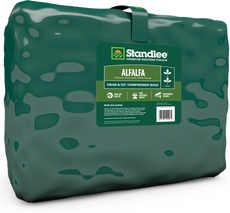ALFALFA AND HORSES
by Dr. Tania Cubitt, Performance Horse Nutrition and Standlee Premium Products Nutritional Consultant
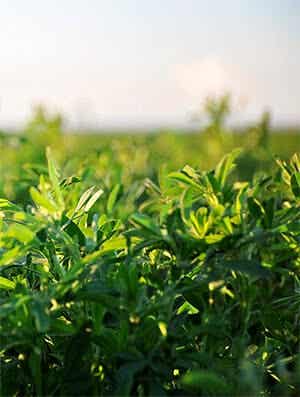
It’s green and leafy, and horses love it, but alfalfa hay also has a bit of a bad reputation in the horse world. It’s been blamed for colic and high spirits, but does alfalfa deserve the stigma that seems to follow it?
The simple answer is “no,” since alfalfa hay is an excellent source of protein, calories, calcium and Vitamin A for horses. But alfalfa also isn’t for every horse—when making a decision about whether to incorporate alfalfa into your feeding program, it’s important to be informed about its strengths and weaknesses.
Alfalfa hay can be an excellent source of calories for horses who need help in gaining weight, or whose exercise demands require additional energy sources. It’s especially helpful for a hard keeper because of its high palatability—horses love to eat it. Feeding alfalfa is an excellent alternative to feeding excessive amounts of grain at meals to get more calories into a horse’s diet.
Alfalfa is usually lower in ber, higher in energy, higher in protein and higher in calcium than grass hays. Because it is higher in energy and protein, using alfalfa makes it easier to meet those needs with minimal or at least lower levels of supplementation.
Featured Standlee Alfalfa Products
Protein
After water, the major constituent of the horse’s body is protein. Eighty percent of the muscles and twenty percent of the skeleton consist of some type of protein. Consequently, protein is essential for growth, and for the repair and formation of new tissue. Protein is also the building material for enzymes and many hormones, giving it a vital role in the regulatory processes of horses. Blood solids are largely protein, and because antibodies and other immune substances are proteins, this nutrient also plays a major function in fighting infection.
As a rule, protein requirements decrease with age. Mature horses use protein to maintain body tissues and synthesize antibodies, blood, hormones and the like, rather than build new masses of muscle and bone associated with growth. Therefore, the younger the horse, the greater the protein requirement when expressed as a percentage of total diet. The exception to the relationship of age and protein requirements is for late pregnancy and lactation, when the mare has increased protein requirements for proper nourishment of the foal.
Alfalfa hay is an excellent source of protein, both in content and quality. It is not unusual for mid-bloom alfalfa hay to have a crude protein content of 17% or greater. The amount of protein supplied by alfalfa can go a long way toward satisfying the high protein requirements of young, growing horses. In the case of mature horses, free-choice alfalfa hay will certainly provide enough protein to satisfy requirements. As a practical recommendation, select alfalfa hays which do not contain extremely high levels of protein (greater than 17% crude protein).
Minerals
Today’s horses are expected to perform at higher levels, mature more rapidly, produce more offspring and live a longer productive life than ever before. All of these factors—performance, growth rate, reproduction and age—complicate the nutrient requirements of the horse in ways unforeseen 20 years ago. Wild horses survive on forage alone. However, wild horses are never expected to perform on the track or in the arena, and their low reproductive rate would drive most professional breeders out of the business.
Everything we expect a horse to do for us exacts a price. It then becomes necessary to replace the nutrients being expended if performance is to be maintained. Couple a complex set of mineral requirements with forages which are often marginal in mineral content, and we have the potential for performance problems.
The mineral content of alfalfa hay is largely dependent on the mineral content of the soil. As would be expected, the mineral content of soil varies from region to region and has certainly changed over the past 20 to 30 years. The mineral content of your alfalfa compared to the mineral content of your neighbor’s, or even your grandfather’s (20 years ago), is certainly different. As a trend, the trace mineral profile (copper, zinc and selenium) of alfalfa is marginal when compared to the trace mineral requirements for growing and performance horses. It is generally recommended that horses being fed strictly alfalfa hay diets be supplemented with additional trace minerals. This trace mineral fortification typically comes in the form of pelleted grain concentrates or low intake mineral supplements.
For young, growing horses, two minerals, calcium and phosphorus, are vital for proper skeletal formation. Alfalfa hay is an excellent source of highly available calcium, but unfortunately is often a poor source of phosphorus. To grow a sound skeleton, young horses first need adequate amounts of both calcium and phosphorus. Next, the young horse requires calcium and phosphorus in the correct ratio to one another. Ideally, we would like to have a total dietary calcium to phosphorus ratio of between 1.5-2 parts calcium to 1 part phosphorus. When feeding strictly alfalfa hay, it is not uncommon to have large amounts of calcium with marginal amounts of phosphorus. In addition, the ratio of calcium to phosphorus in some alfalfa hays approaches 15 parts calcium to 1 part phosphorus. It is recommended that young, growing horses receive supplemental phosphorus in the form of a ration balancer supplement or developing horse commercial concentrate.
Research has shown that in addition to being an excellent energy and protein source, alfalfa hay also has the ability to buffer stomach acid and alleviate ulcer severity and formation.
A study done at Texas A&M University fed 12 horses a pelleted grain and Bermuda grass hay, and 12 horses pelleted grain and alfalfa hay. Each horse in the study had been assigned a gastric ulcer score before the study began as a result of gastric endoscopy.
At the end of the study, the ulcer severity scores of the horses fed alfalfa had dropped overall, while the ulcer severity scores of the horses fed Bermuda grass hay had risen. More than 80 percent of performance horses suffer from some varying degree of ulceration. Alfalfa is high in calcium and protein—both of which have a buffering effect on the acid in the stomach.
Adding a little alfalfa, especially prior to exercise, really helps buffer the stomach acid.
Summary
In conclusion, the availability and nutrient content of alfalfa hay make it a logical forage for horses. Selecting alfalfa hay with moderate protein content and providing additional diet fortification with minerals, help make this a balanced forage for horses.
At Standlee Premium Products, quality starts in the field, where we carefully nurture and harvest our fields to meet product specifications and exceed quality standards. Southern Idaho’s climate and nutrient-rich soils provide ideal conditions for growing high quality alfalfa and other forage types. Standlee has several excellent choices of high quality alfalfa products including compressed bales, chopped alfalfa and pelleted and cubed products.
Some Common Alfalfa Myths Busted
BUSTED!
Rapid diet changes are associated with colic, so it’s possible that if you change from grass hay to alfalfa hay all of a sudden, or you introduce alfalfa hay abruptly, you could increase the risk of colic.
BUSTED!
That’s an old wives’ tale, probably inspired by the fact that horses with high protein intake tend to drink more water, and therefore urinate more. The body’s process for breaking down protein into calories results in nitrogen as a byproduct, which gets filtered out of the body in the horse’s kidneys. A horse that is converting excess protein to calories will drink more water, to aid that filtering, and will have urine with a strong ammonia smell, as the nitrogen is excreted as urea. But the excess protein does not harm the kidneys.
BUSTED!
Not so, if fed appropriately. Alfalfa provides a significant amount of calories; however, an excess of calories in any form, whether from alfalfa, grain or oil, without the exercise to burn them, can result in an excessively energetic horse. Alfalfa fed with a careful eye to the proportions of the whole diet, and the energy needs of the horse, will not create excess energy.

